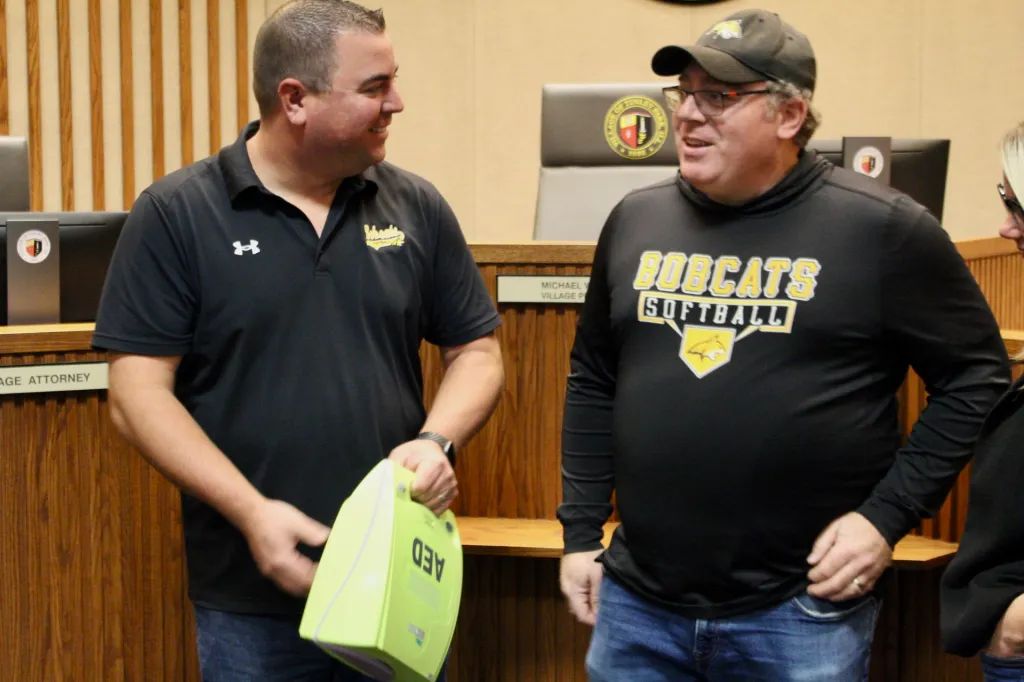Copyright Chicago Tribune

Joe Partacz was coaching at a youth baseball travel tournament in late June when he got a call about the sudden death of his friend and fellow coach Ares Roper, 42. Patacz, league commissioner for the Tinley Park Bulldogs, had coached for years with Roper with the Bulldogs as well as the Tinley Park Bobcats. Roper had been a baseball mainstay, coaching for 10 years, and his death shocked the community, which has honored him in the months since with jerseys, a memorial, home-cooked meals for the family, a fundraiser and more. Partacz has also been working since June on another way to honor Roper – automated external defibrillators. An AED is a portable device that can be used by the public to treat a person in sudden cardiac arrest by delivering an electrical shock to restart the heart. Partacz said the more he thought about the incident, the more he wanted to make sure the league exhausted all avenues of safety on the field. While safety is a huge priority for the league and the local park district, there were no AEDs present on the field that day, due to a number of logistical reasons, he said. “I just felt that it was something that even though maybe, you know, maybe it wouldn’t have made a difference, maybe, what was wrong with Mr. Roper was too far gone to begin with, and there was not much that anybody could have done, but at least this could have given us a fighting chance, at least given us a chance to possibly give him that opportunity,” Partacz said. “The fact that we didn’t have it, it was like what I thought to myself was, I just wanted to see what I could do and try to exhaust all avenues to see if we could get one of these.” Partacz said he reached out to the village and Park District, and on Oct. 21, the village of Tinley Park donated two AEDs in Roper’s memory to the teams, one for the Bobcats and another for the Wildcats, for a total of $42,000, pulled from the fire and medical budget, according to village manager Pat Carr. Partacz said the donation means a lot to the community, as he said Roper had so many ties to players, parents, Park District staff and even most of the Tinley Park Bulldogs Athletic Club. He said as the community has come together in grief, a common sentiment has been that Roper was not only “a loving father and a good husband, but just a kind overall good man.” “The AEDs mean a lot to us and it just goes to show you that here in Tinley, even though you may not know your neighbor, you look out for one another,” Partacz said. Tinley Mayor Michael Glotz said the village takes great pride supporting the Tinley Park Bulldogs and Bobcats. “Having had children play in both organizations, we understand their importance,” Glotz said. “When these exceptional groups reached out for assistance, we were quick to respond. Our commitment is to always prioritize children, coaches, fans, and Tinley Park.” Partacz said it’s especially important to have these AEDs when the league is working with so many people, from young children to parents to grandparents. “This could happen to any one of them, and to know that our complex has this, even if to give our kids a fighting chance, and that’s what I want, you know, and I know the bobcats want the same thing,” Partacz said. Joe Leigh, vice president of the Tinley Park Bobcats, a non-profit, volunteer-run youth sports organization, said he wants league participants to be as safe as they can possibly be, in addition to having an attitude of fun first, winning second. “If there’s any way in which we can try to mitigate anything like this from ever happening again, we’re all in,” Leigh said. He said Roper’s death impacted the entire league and that a lot of people showed up to the memorial or brought his families meals, which shows just how much the community cared for him. He said Roper coached a few teams that stayed together and moved up through the age groups together, which he said is a testament to Roper’s character, that the players wanted to stick with him for so long. The league honored Roper with customized jerseys. A 13 and under travel softball team also put “LLA,” meaning Long Live Ares, on the back of their helmets. “The whole organization felt it, and it feels like at some point in time everyone knows a Roper,” Leigh said. “It was heartbreaking.” Leigh and Partacz both said the next steps for utilizing the AEDs are to get people certified, figure out where to store them and work with the Park District. Partacz said he plans to get his board certified and would like to keep an AED in the concession stand, which board members have access to. Leigh said his league is still figuring out where to have the AED available since their league involves a lot of different sports that travel. He said they have until March, when spring season begins, to figure out “operationalizing” the AEDs. “It opens the door, but we need to put a plan in place and again, it’s unfortunate that a tragedy is kind of sparking these conversations, but there is something good to come, something good to come to bring the leaders of our organization and the bulldogs together to think about this more long term,” Patrick Coyne, treasurer for the Bobcats league, said. Shawn Robey, executive director of the Park District in Tinley Park, said Roper’s death was devastating, and he is happy to help the organizations figure out their plans for implementing the AEDs. He said there are numerous regulatory requirements and considerations set by the Illinois Department of Public Health and other agencies in Cook County that make it hard to implement AEDs at facilities overnight, as the district has to be able to answer to these agencies. He said, for example, there is a requirement for monitoring and checking the AEDs periodically, especially if they are stored outside where they could be vulnerable to heat, cold, theft and more. He said the district can help the organizations get people certified to use the AEDs, which the village said it could do too through the fire department. Robey said the Park District is proactive when it comes to the safety of residents and that all of the district staff are trained above what they’re required to be. “The Park District is always working toward trying to continue to improve what we’re doing which is why I’m very happy for the organization that they were able to get this donation,” Robey said. “While I understand it’s a sensitive subject for a lot of people, it’s important that training keeps reaching as many people as we can,” Robey said.


![Doctors Discuss if LeBron James’ Sciatica Injury Could Lead to Retirement: 'Let the Ego Take a Backseat Now' [Exclusive]](https://d2731bbzmt3wpb.cloudfront.net/news/image/us-west-2:25d97050-7aa7-43a6-a623-8fb02e6af97e/20251031/21cb2179bc9f4a5386de07cac98a3f71.jpg)
